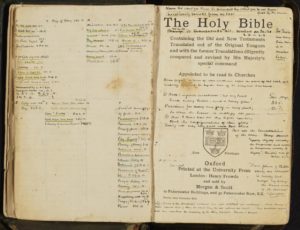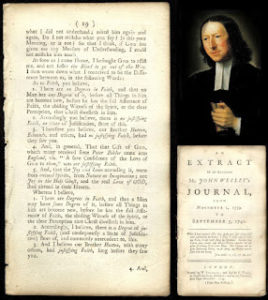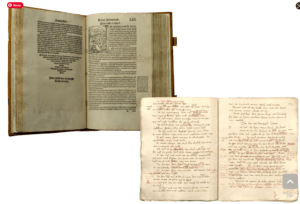Bible journaling is an intimate way to connect with God and grow your faith. When we combine journaling with the Bible, we have a powerful tool to help us deepen our relationship with God. In this beginner’s guide on how to journal with the bible to get you started with bible journaling, we will explore different ways to journal using the Bible and provide some tips to get started.
First, let’s define what Bible journaling means. Journaling with the Bible involves reflecting on God’s Word and writing down our thoughts, feelings, and insights in a journal. The purpose of this practice is to deepen our understanding of God and our relationship with Him. Journaling with the Bible can also help us process difficult emotions, gain wisdom, and receive direction from God.
Here are some tips to get started with journaling with the Bible.

8 Tips for Journaling with the Bible
- Choose a Bible passage or verse to reflect on. You can choose a passage that speaks to you, or use a daily devotional to guide you.
- Write down the passage or verse in your journal. This helps to keep you focused and centered on God’s Word.
- Reflect on the passage or verse. Take some time to meditate on the words and ask God to speak to you through them. Consider what the passage means to you and how it applies to your life.
- Write down your thoughts and insights. Use your journal to record your reflections, feelings, and insights. This can help you process your emotions and gain wisdom from God.
- Use art to illustrate the passage or verse. If you enjoy drawing or painting, you can use your artistic skills to create a visual representation of the passage or verse. This can help you engage with the Scripture on a deeper level and provide a creative outlet for your emotions.
- Use journal prompts to guide your reflection. Journal prompts can help you focus your reflection and provide direction for your writing. You can find a variety of journal prompts online or create your own.
- You can use S.O.A.P. method: Scripture, Observation, Application, and Prayer. Write down a scripture verse, observe what it means to you, apply it to your life, and then pray about it.
- Be honest with yourself and with God. Journaling with the Bible is a personal practice, so be honest with yourself and with God. Share your struggles, doubts, and fears with Him. Remember that God already knows your heart, and He is always ready to listen and help you.
Now that we’ve explored some tips to get started with journaling with the Bible, let’s look at some different ways to approach this practice.
Types of Bible Journaling
- Topical Bible Study Journaling: Choose a specific topic or theme to study in the Bible, and use your journal to record your thoughts, insights, and reflections as you study. This can be a great way to deepen your understanding of a particular area of the Bible.
- Gratitude Journaling: Use your Bible to reflect on the blessings in your life and write down what you are grateful for. This can help you cultivate a heart of gratitude and increase your awareness of God’s provision.
- Prayer Journaling: Use your Bible to guide your prayers and record your requests, praises, and thanksgiving. This can help you stay focused in prayer and track how God is answering your prayers.
- Devotional Journaling: Use a daily devotional to guide your reflection and journaling. Many devotional books provide a passage of Scripture and a reflection on that passage, which can help you deepen your understanding and apply it to your life.
- Scripture Memorization Journaling: Choose a verse or passage to memorize and use your journal to record your progress and insights. This can help you internalize God’s Word and deepen your understanding of its meaning.

Famous Christian People Known for Bible Journaling
- Martin Luther: The famous German theologian and reformer was known to keep a personal notebook where he recorded his reflections on Scripture.
- John Wesley: The founder of Methodism also kept a journal where he recorded his personal reflections on Scripture, as well as his experiences in ministry.
- Susanna Wesley: The mother of John and Charles Wesley was also a prolific writer and theologian who kept a journal where she recorded her insights on Scripture and her experiences as a Christian.
- Hudson Taylor: The famous missionary to China kept a personal notebook where he recorded his reflections on Scripture and his experiences in ministry.
- Amy Carmichael: The Christian missionary to India also kept a journal where she recorded her reflections on Scripture, as well as her experiences in ministry.



Recommended Tools for Bible Journaling
- Bible journaling pens: These pens come in a variety of colors and are specifically designed for use with thin pages of a Bible. They are usually water-based and do not bleed through the pages.
- Colored pencils: Colored pencils are a great alternative to pens and can provide a softer, more subtle look. They also come in a wide range of colors and can be blended to create new shades.
- Gel pens: Gel pens are similar to Bible journaling pens but offer a smoother writing experience. They are also available in a wide range of colors.
- Watercolor paints: Watercolor paints can be used to add vibrant colors and artistic effects to Bible journaling pages. They can be used with a brush or a water brush.
- Stickers and washi tape: These decorative elements can be used to add texture and interest to Bible journaling pages. They come in a variety of designs and styles and can be used to highlight key verses or add visual interest.
- Stencils: Stencils can be used to create clean, uniform designs and lettering. They are available in a variety of shapes and sizes and can be used with pens, pencils, or paints.
- Highlighters: Highlighters can be used to highlight key verses or passages in a Bible. They come in a variety of colors and can add visual interest to a page.
Bible journaling can be a powerful tool for spiritual growth and self-reflection. By incorporating daily scripture reading, prayer, and intentional journaling, you can deepen your relationship with God and gain greater insight into your own thoughts and emotions. Remember to approach journaling with a spirit of openness and curiosity, allowing yourself to be vulnerable and honest as you explore your inner world.
It’s important to note that there is no right or wrong way to journal with the Bible. Each person’s approach will be unique to their own needs and preferences. The key is to find what works best for you and to commit to a regular practice that fits into your daily routine. Whether you prefer a structured journaling method or a more free-flowing approach, the important thing is to stay consistent and allow God to work in and through your journaling practice.
Friends, I encourage you to take the first step and incorporate journaling with the Bible into your daily routine. Don’t worry about being perfect or having it all figured out. Start where you are and allow God to guide you on this journey. May this guide be helpful as you begin this new chapter in your spiritual journey. Happy journaling!


